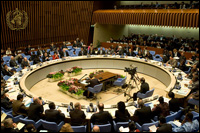The Executive Board of the World Health Organization recently finished its special session on the Ebola virus disease outbreak in West Africa and its 136th regular session. Significantly, the Executive Board adopted a resolution, EBSS3.R1 (Ebola Resolution), during the special session. This Resolution makes significant pronouncements and calls for a broad range of actions.

However, a big question, as aptly pointed out in a recent N.Y. Times editorial, remains unanswered. This “big question” is: “whether the organization’s 194 member states will set aside their typical politicking on behalf of national self-interests and allow [WHO] to function as the global health leader it ought to be.” To begin predicting whether the motivation and mandate for change exists to answer the N.Y. Times “big question” in the affirmative, it may be helpful to highlight particular aspects of the Ebola Resolution.
Below are five observations regarding the Ebola Resolution:
- Constitutional Mandate. In addition to reaffirming WHO’s role as the directing and coordinating authority on international health work, the Ebola Resolution requests the Director General “to strengthen the emergency operational capabilities of the Organization to enable it to fulfill its constitutional mandate and respond to emergencies with health consequences on the basis of an all-hazards approach.“ The use of the terms “operational” and “respond” are important. Questions exist as to the general nature of WHO, i.e., whether it is a normative or operational organization or both. Previously, arguments were made that WHO is not a first responder. With the development of a Foreign Medical Teams unit at WHO, as discussed in the Ebola Resolution, and the reference to WHO’s operational role – thematic questions exist as to how Member States view WHO’s role in a public health emergency and whether this role has shifted from a technical advisor to an operational leader.
- Reciprocal relationships. The Ebola Resolution recognizes that the development of strong and resilient health systems and fulfillment of the International Health Regulations (2005) core capacities are symbiotic. It is important that Member States recognize the ability to adequately react to a potential public health emergency is rooted in the strength of the health system facing the public health emergency. The Ebola Resolution encourages “Member States to consider promoting health system strengthening and IHR core capacities for inclusion in the implementation of the health goal of the post-2015 development agenda.” Whether the need to sustainably support health systems to diminish the impact of public health emergencies remains a topic in the forefront of Member States policies will support any conclusions made regarding the N.Y. Times big question.
- Intellectual Property. Intellectual property remains a thorny issue for Member States in determining the role of WHO as a global health leader. Once again, in the Ebola Resolution, intellectual property concerns were raised multiple times and in multiple different manners. Besides reaffirming the global strategy and plan of action on public health, innovation and intellectual property, the Ebola Resolution calls on Member States to collaborate “on models and approaches that support the delinkage of the cost of new research and development from the prices of medicines, vaccines, and other diagnostics for Ebola” and recognizes the need to encourage research “including the sharing of samples and epidemiological data in accordance with national or regional legislation on Ebola[.]” In many ways, these two points may be considered somewhat antagonistic requests. However, in the hope of answering the N.Y. Times big question in the affirmative, Member States must constructively continue to negotiate the need for intellectual property in public health interventions and WHO’s role in determining such need.
- Funding. Discussion of WHO’s budgetary woes continue. The Ebola Resolution calls for the speedy reallocation of funds “without compromising the Organization’s programme priorities.” Further, the Ebola Resolution calls for the development of a much discussed contingency fund. As a fundamental point – no pun intended – any contingency fund or reallocation of funds must have sufficient and realized monetary amounts for the concept to be effective. With regards to the contingency fund, to answer the N.Y. Times big question in the affirmative, Member States must not only approve the concept of a contingency fund, but also must actually contribute adequate funds to realize the purpose of such a fund.
- Communications. The Ebola emergency re-emphasized how important health communications are during a public health emergency. The initial response to the emergency demonstrated how communication failures perpetuated the spread of the disease. Communication strategies needed to be revamped at all levels. The Ebola Resolution calls for the Director-General “to continue to develop and implement an Organization-wide communications strategy to improve routine communications, messaging about preventative measures, risk communication and emergency communications[.]” In an upstream manner, Member States must work with the Secretariat to accurately communicate disease surveillance information to WHO and, in a downstream manner, Member States should aim to tailor the communications received from WHO to reach the Member State’s population and to serve its intended purpose.
The Ebola Resolution is wide ranging but it raises many issues – beyond those discussed above – that have repeatedly plagued WHO from being able “to function as the global health leader it ought to be.” Unfortunately, there is no simple patch or fix to allow WHO to function as such a leader. Instead, concerted and comprehensive action must be taken. It remains to be seen, however, whether there will be the continued drive to reform WHO into an efficiently functioning global health leader. I have hope that one day we will be able to answer the N.Y. Times Editorial Board’s “big question” in the affirmative.



